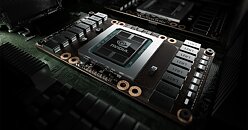Friday, January 3rd 2020

NVIDIA's Next-Generation Ampere GPUs to be 50% Faster than Turing at Half the Power
As we approach the release of NVIDIA's Ampere GPUs, which are rumored to launch in the second half of this year, more rumors and information about the upcoming graphics cards are appearing. Today, according to the latest report made by Taipei Times, NVIDIA's next-generation of graphics cards based on "Ampere" architecture is rumored to have as much as 50% performance uplift compared to the previous generations of Turing GPUs, while using having half the power consumption.
Built using Samsung's 7 nm manufacturing node, Ampere is poised to be the new king among all future GPUs. The rumored 50% performance increase is not impossible, due to features and improvements that the new 7 nm manufacturing node brings. If utilizing the density alone, NVIDIA can extract at least 50% extra performance that is due to the use of a smaller node. However, performance should increase even further because Ampere will bring new architecture as well. Combining a new manufacturing node and new microarchitecture, Ampere will reduce power consumption in half, making for a very efficient GPU solution. We still don't know if the performance will increase mostly for ray tracing applications, or will NVIDIA put the focus on general graphics performance.
Source:
Taipei Times
Built using Samsung's 7 nm manufacturing node, Ampere is poised to be the new king among all future GPUs. The rumored 50% performance increase is not impossible, due to features and improvements that the new 7 nm manufacturing node brings. If utilizing the density alone, NVIDIA can extract at least 50% extra performance that is due to the use of a smaller node. However, performance should increase even further because Ampere will bring new architecture as well. Combining a new manufacturing node and new microarchitecture, Ampere will reduce power consumption in half, making for a very efficient GPU solution. We still don't know if the performance will increase mostly for ray tracing applications, or will NVIDIA put the focus on general graphics performance.

227 Comments on NVIDIA's Next-Generation Ampere GPUs to be 50% Faster than Turing at Half the Power
I like Steve at Gamer's Nexus' comment about these pages; they are just search engine spam.
or....its based on userbench??? Wth?? Oye.
Thanks for the TPU review nevertheless,..I can agree with that, as controlled benchmarks would show real performance improvement differences. As with non controlled can be somewhat manipulated to show altered results.
Fury X beat it at 4k at release (1440p later on/depending on tests) was very close to it otherwise in 1080p (who cares, but oh well).
That was "countered" by a valid argument, that that is stock 980Ti and actual AIBs are OCable good 20% beyond that.
However, once 1080 popped out, people have forgotten about that nice quirk of 980Ti and now we in all seriousness discuss how 1080 was 33%-ish faster.
Sorry about that.
If perf bumps are true, it will be reflected in pricing accordingly.
1080Ti is not a correct comparison to much cheaper 980Ti, it's even arguable if 1080 is.
980TI MSRP: $649
1080TI MSRP: $699
780TI > 980TI
980TI > 1080TI
Say what again now? 1080ti's price point was far too low given its performance. And let's face it, that price point is STILL relevant today...
2070S MSRP: $499
See how bigger perf jumps translate to bigger price gaps over time? Hell, the 2070S (=1080TI) even cannibalizes the 2080 and the 2080S for most people because of its price drop. Its a performance perf/dollar king now and that is also what the 5700XT is priced towards today (of course going under the price with slightly lower perf as usual).
To drive it home
1070 MSRP: $379
Complaining about the Pascal price hike was never realistic, and here is your proof. We got a LOT more for our money there than we ever did during Kepler or Maxwell. Especially in terms of VRAM. Everything's got a lush 8 GB (or more) to work with. The ONLY reason the 980ti is still relevant is because its the only Maxwell card with 6GB. Try that with the budget 970...
Now let's check reality, shall we:
1080 (non TI) FE: $699
1080 (non TI) "later on edition": $599
Did I mention it was "non-TI"? Thanks.
Now, TI version came later, after 1080 milked the market for about 1 year.
#HowToMilk101S right? The one released after AMD spanked 2070?
That's cool.
2070 non S, however, released for $599 for FE edition.
Are you telling me it was slower than 1080Ti? Oh, what as strange "improvement" of perf/$, chuckle.
Last I checked, they are a for profit business. Perhaps if amd had anything worthwhile at the time, prices wouldnt have inflated so much...
And even without competition the performance cost was reduced by 100 bucks MSRP, so, your point?